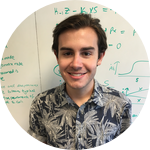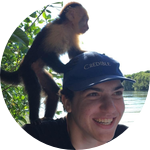About This Project
The primary objective of the project is to create an industrially-comparable method of producing PHA, a biodegradable plastic, from Styrofoam (polystyrene) waste. We hypothesize that a genetically modifying E. coli can convert styrene (monomerized polystyrene) to P3HB, a specific PHA, with just two plasmids. Our device will aim to reduce the 30% of plastic waste volume accounted for by polystyrene while simultaneously enabling cost-effective production of PHA.
Ask the Scientists
Join The DiscussionWhat is the context of this research?
In past experiments, researchers produced (medium chain) mclPHAs from styrene with Pseudomonas putida, but production failed to meet the industry standard. These mclPHAs also lacked useful polymer properties found in other, shorter, PHAs. E. coli has been utilized through genetic engineering with expensive carbon sources, such as glucose, to produce P3HB, a desirable PHA for industrial use.
By introducing genes for the sty and pha pathways to E. coli, styrene can be metabolized by the bacteria to produce P3HB. Coupling the need for a cost-effective method to process polystyrene waste and sustainably produce PHAs creates a niche market in which two problems can be solved with a single solution
What is the significance of this project?
Recycling is perceived as an essential practice for an environmentally-friendly lifestyle. However, we have found inherent flaws in the recycling industry. For example, if recycling is not profitable, companies will simply offload invaluable recyclables at the landfill. In addition, while recycling aims to reuse materials that would otherwise go to waste, goods made from recycled materials decrease in quality after each reuse, leading to a product that cannot be further recycled. This downcycling perpetuates the production of waste.
Our team decided mainstream recycling was not enough. There is a need to reduce waste rather than simply slow its accumulation. Thus, we are tackling the transformation of Styrofoam into biodegradable plastic.
What are the goals of the project?
The primary aim of the project is to create an industrially-comparable method of producing PHAs from waste. This will be achieved through engineering E. coli to convert styrene (monomerized polystyrene) to P3HB with just two plasmids. The first contains the sty sequence, which converts styrene into phenylacetate. Phenylacetate is converted to acetyl-CoA through the endogenous paa sequence, which is maximized in E. coli K12, our chassis organism. The second plasmid contains the pha sequence which converts acetyl-CoA into P3HB. To prevent plasmid loss, each plasmid will contain complimentary halves of the kanamycin resistance gene. The success of each step will be validated by acetyl-CoA and P3HB assays. We plan to maximize P3HB production by optimizing conditions.
Budget
Our budget will go towards the construction and validation of two plasmids. This utilizes molecular cloning which requires several reagents, gels, and purification kits. The construct sequence will be commercially verified. With the correct sequences, the functionality of our plasmids will be tested through various assays. The aforementioned costs in addition lab consumables are vital for the execution of our experiments.
Endorsed by
 Project Timeline
Project Timeline
The month of May was dedicated to designing the most effective plasmid in E. coli K12. Once our vector has been synthesized, cloned, and transformed, experimentation will begin. We will test the device from July to September, with the intent of optimizing each step of the conversion process. Our project will be complete by November 4th (in accordance the iGEM competition) where we will present our results on the global stage.
May 21, 2019
Project launched
Jun 10, 2019
Formalize plasmid design
Jun 10, 2019
Project Launched
Jun 17, 2019
Engineer styrene feeding apparatus
Jul 15, 2019
Demonstrate plasmid functionality
Meet the Team
Alec Brewer
Alec is a rising 3rd year student studying biomedical engineering. He is highly involved with the entrepreneurship community on Grounds (campus) and is determined to change the world with a product of his design. In his free time, Alec enjoys raising his puppy, working out and inhaling food.
Jermaine Elijah Austin
Jermaine is a rising 2nd year majoring in Biochemistry. He is fascinated by how the arrangement of four nucleic acids is responsible for the diversity of life. When he is not in the lab doing research you can find him binge watching Netflix!
Katie Zhang
Katie is a rising 2nd year who is planning to major in Biology and Women, Gender, & Sexuality. She is interested in combining science and humanities disciplines to better inform both practices. If she’s not in the classroom, you’ll most likely find her in the snack section at the Asian store!
Simonne Guenette
Simonne is a rising 2nd year studying biology and computer science. She is interested in using biotechnological approaches to solve the world’s environmental problems. In her free time, Simonne enjoys hiking, reading, running, and cooking. Simonne’s favorite shoes are Chacos, but she never wears them in the lab!
Shaalini Desai
Shaalini is a rising 2nd year intending to major in Cognitive Science on a pre-optometry track. In addition to actively promoting STEM in the community, she is interested in studying visual perception and visual changes as a result of neurological conditions. Aside from academics, Shaalini enjoys dancing and spending hours in Michaels.
Benjamin Ascoli
Ben is a rising 2nd year majoring in computer science. He loves to code and play videogames and he even has national ranking in Hearthstone. Due to his lovable personality, Ben has been voted as our team mascot.
Jainam Modh
Jainam is a rising 2nd year majoring in biomedical engineering on the pre-med track. He enjoys learning about the intricate details that make up biological systems from the nano-scale to the organismal level. While pouring through scientific literature, Jainam keeps everyone entertained by dancing and grooving to any song as he practices for his collegiate dance team.
Hannah Towler
Hannah is a rising 2nd year planning to major in biomedical engineering. Her favorite part of engineering is designing as she loves to draw (especially cats and bananas!) If Hannah is not drawing or designing, you can find her dancing alone in her room with all the blinds drawn.
Evan Biedermann
Evan is a rising 3rd year studying biomedical engineering. He loves to pick things apart to see how they work. However, his other passion is music. As director of his acapella group, Evan loves to put on a show.
Aarati Pokharel
Aarati is a rising 2nd year who plans on majoring in Human Biology. She is passionate about examining the extraordinary interplay between modern biology and society. In her free time Aarati enjoys exploring the outdoors with friends and relaxing with a good book.
Additional Information
The International Genetically Engineered Machine competition, better known as iGEM, is an annual competition in which hundreds of student-led teams from around the world compete for synthetic biology acclaim. Each year, ~350 teams spend much of the year researching and developing a biological device. Teams are required to engineer a viable device from a chassis organism of choice, inform the community through human practices, computationally model various processes and pathways, and construct a website to formally address the entire project’s contents. The competition culminates in November at a symposium where each team presents their devices on the global stage. Winners are chosen according to student’s ability to exceed the judges expectations in several categories, as well as overall the take home the grand prize, the platinum biobrick.
Project Backers
- 45Backers
- 112%Funded
- $1,747Total Donations
- $38.82Average Donation












